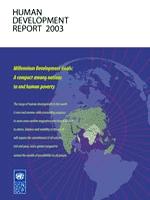Human Development Report 2003
Human Development Report 2003
January 1, 2003
The new century opened with an unprecedented declaration of solidarity and determination to rid the world of poverty. In 2000 the UN Millennium Declaration, adopted at the largest-ever gathering of heads of state, committed countries — rich and poor — to doing all they can to eradicate poverty, promote human dignity and equality and achieve peace, democracy and environmental sustainability. World leaders promised to work together to meet concrete targets for advancing development and reducing poverty by 2015 or earlier.
Emanating from the Millennium Declaration, the Millennium Development Goals bind countries to do more in the attack on inadequate incomes, widespread hunger, gender inequality, environmental deterioration and lack of education, health care and clean water. They also include actions to reduce debt and increase aid, trade and technology transfers to poor countries.
This Report adds to the understanding of poverty by analysing the root causes of failed development. It demonstrates that the range of human development in the world is vast and uneven, with astounding progress in some areas amidst stagnation and dismal decline in others. Balance and stability in the world requires the commitment of all nations, rich and poor, and a global development compact to extend the wealth of possibilities to all people.
Highlights
- The need for economic reforms to establish macroeconomic stability;
- The need for strong institutions and governance—to enforce the rule of law and control corruption;
- The need for social justice and involving people in decisions that affect them and their communities and countries;
- The structural constraints that impede economic growth and human development.

 Locations
Locations





